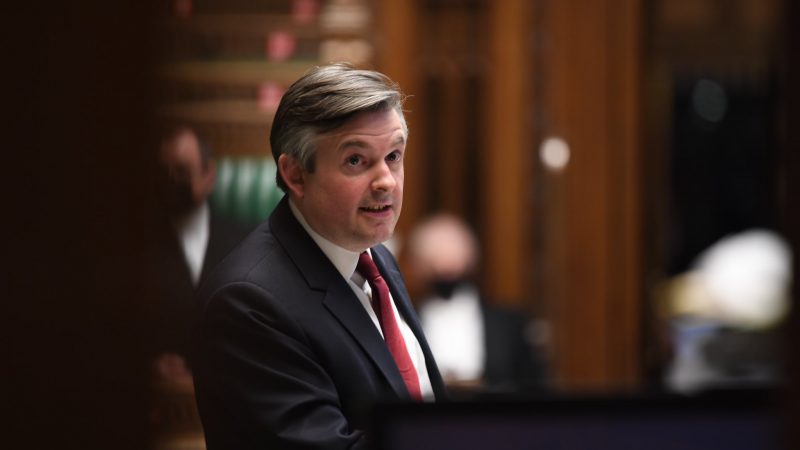
Jonathan Ashworth has called on government minister to bring forward a “fully resourced rescue plan” to prioritise patient care in the recovery from the coronavirus pandemic and bring down waiting times for NHS treatment.
Highlighting research from the party, which shows hundreds of thousands of people are waiting more than 18 weeks for treatment, the Shadow Health Secretary declared: “There shouldn’t have to be a choice between Covid care and cancer care.”
The analysis from Labour found that 366,194 have been left waiting for more than a year to receive treatment, which is one in 12 people currently on health service waiting lists. This figure stood at 1,643 in January last year.
Data reveals that 22,000 people have waited over a year for gynaecology appointments, more than 4,500 people are waiting for cardiology appointments, 26,000 waiting for oral surgery and over 3,700 waiting for brain surgery.
Office for National statistics monthly reporting shows that the number of people waiting longer than 18 weeks, the maximum waiting time set out in the NHS constitution, has risen across all 18 treatment areas.
Labour argued that the figure for patients waiting for longer than the maximum period has been steadily climbing, and highlighted that 2016 was the last year in which the statutory 92% of patients being treated within 18 weeks was met.
“Years of underfunding and cutbacks meant we entered the crisis with waiting lists growing and targets for cancer treatment missed. But there shouldn’t have to be a choice between Covid care and cancer care,” Ashworth said.
“It is now crucial that ministers provide hospitals, our NHS staff and patients with a fully resourced rescue plan to bring waiting lists down.” The Shadow Health Secretary has today demanded that government ministers:
- Provide a quarterly plan on action being taken to bring down waiting lists;
- Deliver an “NHS rescue plan” to ensure the health service has the staff and equipment to deliver cancer care, surgery and mental health care;
- Strengthen the NHS constitution to eliminate waits over 52 weeks; and
- Give NHS staff a “fair pay rise”.
“Leaving patients in limbo waiting for surgery risks their condition worsening leading to permanent disability, loss of livelihood and tragically for some loss of life,” he added. “Labour will be using our voice and vote in parliament to demand action to bring waiting lists down and deliver the very best cancer and mental health care.”
Keir Starmer promised to “tackle waiting lists, pay our NHS heroes a decent wage and ensure that our children get the mental health support that they need” in a party political broadcast ahead of the elections next month.
A Department of Health and Social Care spokesperson told LabourList: “Our NHS has faced huge challenges over the past year due to Covid and we continue to support our incredible health and care staff who have kept services open for thousands of patients.
“This government will back the NHS at every turn, making available £63bn in health services over the last year and an additional £29bn next year. This includes £1bn to support NHS recovery by incentivising providers to address backlogs and tackle long waiting lists which have built up because of the pandemic.
“Over one million NHS staff have benefited from a multi-year pay deal agreed with trade unions, which delivered a pay rise of over 12% for newly qualified nurses.”
Labour has made NHS pay, and in particular nurses’ pay, a central part of its messaging ahead of the vote, with the Labour leader and Shadow Health Secretary telling the public that “a vote for Labour is a vote to support our nurses”.
The government recently recommended that NHS workers receive a pay rise of 1%, which amounts to a real-terms pay cut as it fails to keep pace with inflation. Ministers have argued that nurses have received a 12.8% increase since 2017/18.
This claim, repeated by Boris Johnson in the House of Commons, does not account for inflation or the impact of austerity on their wages up to 2017. It also only applies to one group of nurses working rather than all those working in the NHS.
Labour has faced criticism by some over the party’s refusal to back union demands for a 12% pay rise for NHS nurses, as the opposition has only said they should “at the very least” receive the 2.1% increase planned by the government last year.
The government outlined proposals for a reorganisation of the NHS earlier this year, after its plans were leaked, giving ministers more powers to direct NHS England on its functions and reduce the independence of its chief executive
It is the first white paper on health since the coalition’s controversial 2010 health and social care bill. Ashworth criticised the timing of the announcement, made “in the middle of the biggest public health crisis our NHS has ever faced”.
He pointed out that Matt Hancock made no mention of waiting lists when announcing the white paper in parliament, adding that it was only mentioned once in the leaked white paper, asking: “How will he bring waiting lists down?”
Labour has repeatedly urged ministers to get to grips with rising patient waiting times and cancer care. “We need an NHS rescue package,” the Shadow Health Secretary told Sky News in March. “We need a plan to put funding into the NHS.”



More from LabourList
Haigh: We won’t shut ticket offices or cut jobs – or nationalise water
Lou Haigh to reveal ‘roadmap’ for public ownership of railways within first term
Rochdale Labour says brick thrown at candidate’s home with ‘f*** Labour’ note